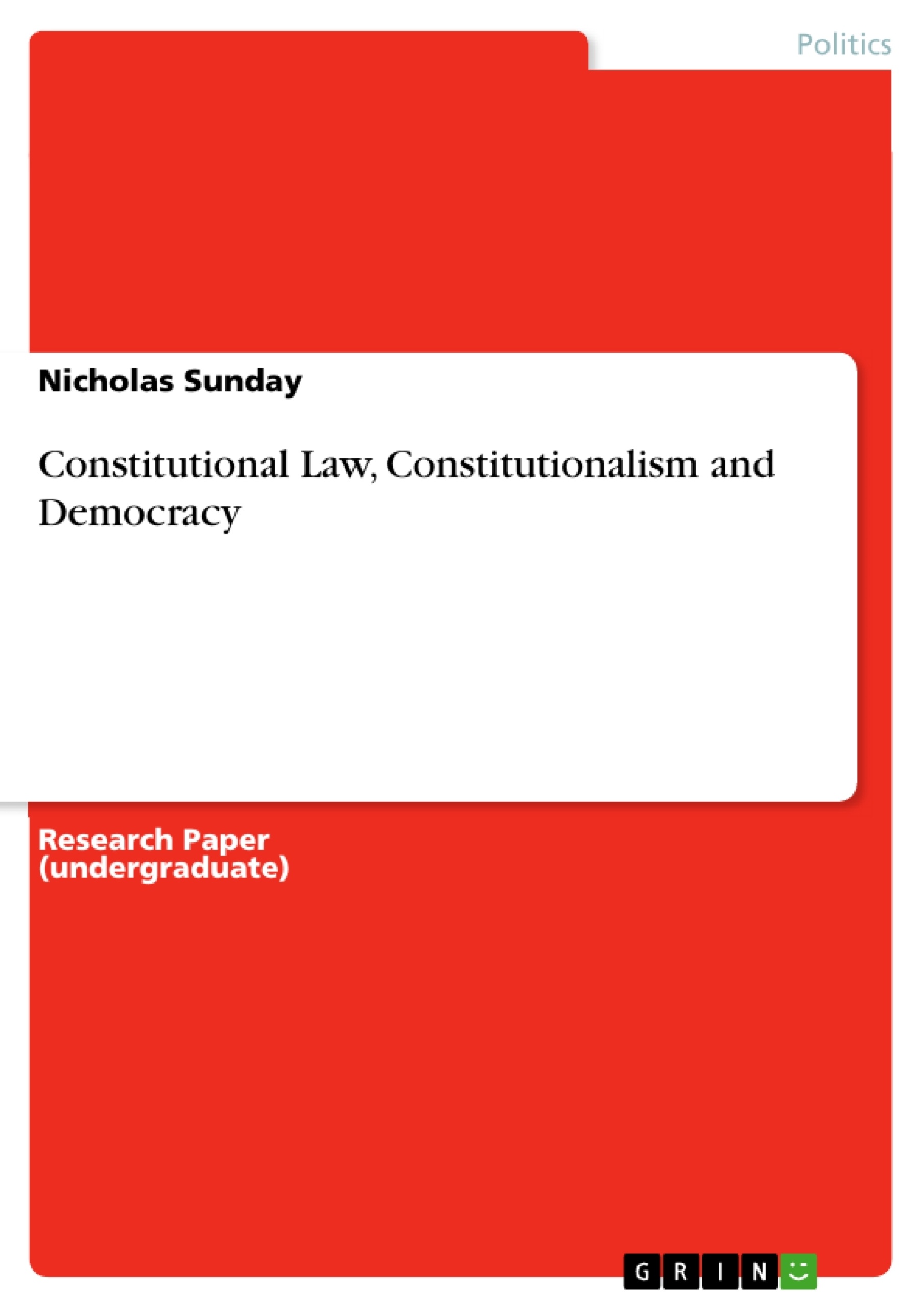Constitutionalism form the core of good government in the modern democratic world to check on the powers of the different organs of government and the protection of liberty and fundamental rights of individuals within that sovereign territory. All efforts are made by the developed and the developing countries in upholding the rule of law, which are quaranteed through the constitution, to promote democracy for a just and fair society.
However, good the notion of the constitution is, there are different definitions applied by different stakeholders on the notion of what forms a good democratic polity and good constitution and constitutionalism. It is against this background that an elaborate research has been conducted by the author of the subject matter as part of the requirement in the award of Doctor of Juridical Science
Table of Contents
- Chapter 1: Definition and Scope of Constitutional Law
- Chapter 2
- Chapter 3
- Chapter 4
- Chapter 5
- Chapter 6
Objectives and Key Themes
This research aims to explore the concepts of constitutional law, constitutionalism, and their relationship with democracy. It investigates the various definitions and interpretations of these concepts, examining their practical application in different political systems.
- The definition and scope of constitutional law.
- The nature and role of constitutions, both written and unwritten.
- The concept of constitutionalism and its implications for the limitation of state power.
- The relationship between constitutionalism, democracy, and the protection of individual rights.
- Comparative analysis of constitutional systems.
Chapter Summaries
Chapter 1: Definition and Scope of Constitutional Law: This chapter delves into the fundamental questions at the heart of constitutional law, exploring the complex interplay between individual freedom and social justice. It examines the relationship between the individual and the state through the lens of law, highlighting how constitutional law governs political relations and reflects the distribution of power within a society. The chapter contrasts the role of constitutional law in stable societies characterized by consensus and orderly relations with its near absence or distorted function in unstable contexts marked by violence and power struggles. It further defines the concept of a constitution, distinguishing between its meaning as a formal document and its broader meaning as encompassing the entire system of governance, including legal doctrines, institutional practices, and political norms. The historical evolution of written constitutions, particularly emerging from the American and French Revolutions, is discussed, tracing the changing understanding and significance of this concept. The chapter concludes by contrasting the legal frameworks of countries with written constitutions, with those lacking formal constitutional documents like the UK, emphasizing the implications for the protection of individual rights and the enforcement of constitutional limits.
Keywords
Constitutional law, constitutionalism, democracy, rule of law, individual rights, state power, written constitutions, unwritten constitutions, separation of powers, legislative supremacy, judicial review, comparative constitutional law.
Frequently Asked Questions: Comprehensive Language Preview
What is the purpose of this document?
This document provides a comprehensive preview of a text on constitutional law. It includes the table of contents, objectives and key themes, chapter summaries, and keywords.
What topics are covered in the Table of Contents?
The table of contents lists chapters covering the definition and scope of constitutional law, and additional chapters (Chapter 2-6), the specific content of which is not detailed in this preview.
What are the main objectives and key themes explored?
The research explores the concepts of constitutional law and constitutionalism and their relationship with democracy. It investigates various definitions and interpretations, examining their practical application in different political systems. Key themes include the definition and scope of constitutional law, the nature and role of constitutions (written and unwritten), constitutionalism's implications for limiting state power, the relationship between constitutionalism, democracy, and individual rights protection, and comparative analysis of constitutional systems.
What is the focus of Chapter 1: Definition and Scope of Constitutional Law?
Chapter 1 examines the fundamental questions of constitutional law, exploring the interplay between individual freedom and social justice. It analyzes the individual-state relationship through law, highlighting how constitutional law governs political relations and power distribution. It contrasts constitutional law's role in stable versus unstable societies, defines the concept of a constitution (both formally and broadly), discusses the historical evolution of written constitutions (especially from the American and French Revolutions), and contrasts legal frameworks of countries with and without written constitutions.
What are the key words associated with this text?
Key words include: Constitutional law, constitutionalism, democracy, rule of law, individual rights, state power, written constitutions, unwritten constitutions, separation of powers, legislative supremacy, judicial review, comparative constitutional law.
What kind of information is missing from this preview?
This preview omits the detailed content of chapters 2 through 6. It only offers a general overview of the book's subject matter and scope.
For whom is this preview intended?
This preview is intended for academic use, facilitating analysis of themes in a structured and professional manner.
- Arbeit zitieren
- Professor Nicholas Sunday (Autor:in), 2013, Constitutional Law, Constitutionalism and Democracy, München, GRIN Verlag, https://www.grin.com/document/213984



